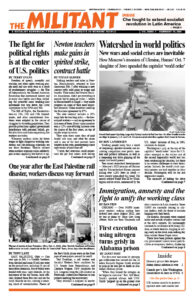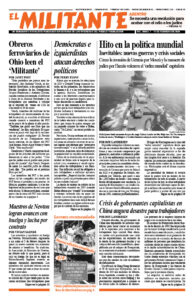Striking teachers and aides in Newton, Massachusetts, returned to their classrooms Feb. 5 after winning a new contract with solid gains in wages and benefits. Their union, the Newton Teachers Association, didn’t get everything it wanted, but by going on strike — which in Massachusetts is illegal — they made progress on some of their most important demands. Union members voted up the four-year agreement by 97%.
The new contract includes a 30% wage hike for teaching aides — the lowest-paid workers — and an agreement to hire more of them. Every union member won a 12% cost-of-living increase over the course of the four years, on top of regular wage increases.
They won three more days of paid family sick time, and what the union said is one of the best parental leave benefits in the state, guaranteeing a least eight weeks of paid time off.
“I wish that everyone could experience the joy that comes with having stood up for yourself and your colleagues together,” Kelly Henderson, a teacher in Newton, told the Militant Feb. 7. “Our schools are going to be so much stronger because our union became so much stronger.”
The close to 2,000 union members walked out Jan. 19 after trying to negotiate with the city for 16 months, working without a contract since last August. The strike was the seventh and longest by teachers in Massachusetts since 2022, all of which were illegal and hit with heavy fines. During this strike the Newton Teachers Association was fined $625,000, which they are fighting to get reduced.
The rising cost of living had left union members feeling they had no choice but to strike.
The strike won wide support. Parents and neighbors joined picket lines, often with meals in hand. Religious leaders from the area posted an open letter of support and many churches and synagogues opened their doors for pickets to warm up and offered child care. Rallies by students and others were held regularly at City Hall. The school district tried to mobilize opposition to the union, featuring parents pressing for strikers to go back to work.
Glenn Koocher, executive director of the Massachusetts Association of School Committees, told the Boston Globe that 15 to 20 Massachusetts districts have been watching what happened in Newton. “A lot of districts that have contracts coming up are thinking about what this means if the unions are becoming more militant, if they’re not afraid of a judge, if they’re not afraid of being held in contempt,” he said.
Max Page, president of the Massachusetts Teachers Association, said strikes are “only a new trend if school committees, mayors, and city councils don’t come to the table ready to bargain.”

